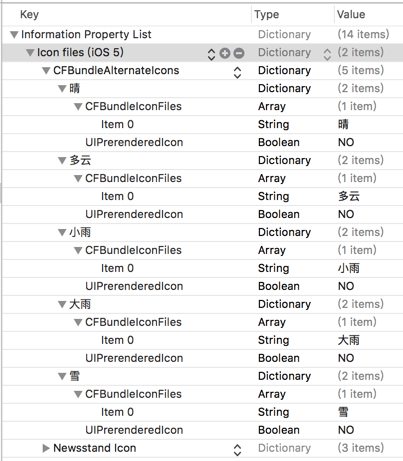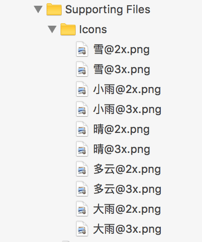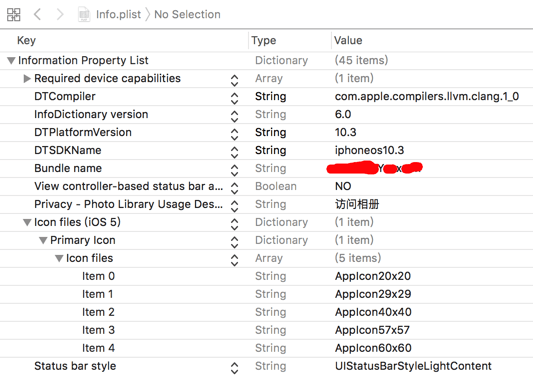动态改变APP图标
一、iOS动态更换App图标(一):基础使用
该功能应用的场景
1、白天/夜间模式切换,在切换App主色调同时切换App图标。
2、各类皮肤主题(淘宝就可换肤),附带App图标一块更换。
3、利用App图标表达某种特定功能,如Demo中的,提示当前天气。
4、图标促销提示,如淘宝京东特定节日:11.11、6.18,提前更换App图标。
当然该功能(API)当前只支持iOS10.3以上的系统,所以只能当做一项附加功能来进行使用。下面将详细讲解下如何使用代码来实现此功能。
API方法
@interface UIApplication (UIAlternateApplicationIcons) // 如果为NO,表示当前进程不支持替换图标 @property (readonly, nonatomic) BOOL supportsAlternateIcons NS_EXTENSION_UNAVAILABLE("Extensions may not have alternate icons") API_AVAILABLE(ios(10.3), tvos(10.2)); // 传入nil代表使用主图标. 完成后的操作将会在任意的后台队列中异步执行; 如果需要更改UI,请确保在主队列中执行. - (void)setAlternateIconName:(nullable NSString *)alternateIconName completionHandler:(nullable void (^)(NSError *_Nullable error))completionHandler NS_EXTENSION_UNAVAILABLE("Extensions may not have alternate icons") API_AVAILABLE(ios(10.3), tvos(10.2)); // 如果alternateIconName为nil,则代表当前使用的是主图标. @property (nullable, readonly, nonatomic) NSString *alternateIconName NS_EXTENSION_UNAVAILABLE("Extensions may not have alternate icons") API_AVAILABLE(ios(10.3), tvos(10.2)); @end
- (void)setAppIconWithName:(NSString *)iconName { if (![[UIApplication sharedApplication] supportsAlternateIcons]) { return; } if ([iconName isEqualToString:@""]) { iconName = nil; } [[UIApplication sharedApplication] setAlternateIconName:iconName completionHandler:^(NSError * _Nullable error) { if (error) { NSLog(@"更换app图标发生错误了 : %@",error); } }]; }
配置文件(Info.plist)

当然也要拖入对应的App图标:

不过这里我们好像还少配置了App主图标,也就是正常情况下我们的图标。按照文档所说,我们需要在CFBundleIcons里面配置CFBundlePrimaryIcon这个主图标对应的内容,但是实际上,我们还是按照老方法,在Assets.xcassets中配置AppIcon,对应尺寸填上对应图片即可。为什么这样子就可以配置主图标呢?让我们来看看某知名电商的ipa(在AppStore上下载的包)内的Info.plist(位于Payload/XXXXXX/Info.plist):

拦截弹框
既然知道了弹框是UIAlertController,那么我们自然而然想到,该弹框是由ViewController通过presentViewController:animated:completion:方法弹出。那么我们就可以通过Method swizzling hook该弹框,不让其进行弹出即可:
#import "UIViewController+Present.h" #import <objc/runtime.h> @implementation UIViewController (Present) + (void)load { static dispatch_once_t onceToken; dispatch_once(&onceToken, ^{ Method presentM = class_getInstanceMethod(self.class, @selector(presentViewController:animated:completion:)); Method presentSwizzlingM = class_getInstanceMethod(self.class, @selector(dy_presentViewController:animated:completion:)); method_exchangeImplementations(presentM, presentSwizzlingM); }); } - (void)dy_presentViewController:(UIViewController *)viewControllerToPresent animated:(BOOL)flag completion:(void (^)(void))completion { if ([viewControllerToPresent isKindOfClass:[UIAlertController class]]) { NSLog(@"title : %@",((UIAlertController *)viewControllerToPresent).title); NSLog(@"message : %@",((UIAlertController *)viewControllerToPresent).message); UIAlertController *alertController = (UIAlertController *)viewControllerToPresent; if (alertController.title == nil && alertController.message == nil) { return; } else { [self dy_presentViewController:viewControllerToPresent animated:flag completion:completion]; return; } } [self dy_presentViewController:viewControllerToPresent animated:flag completion:completion]; } @end
或者
#import "ViewController.h" #import <objc/runtime.h> // 利用runtime来替换展现弹出框的方法 static dispatch_once_t onceToken; dispatch_once(&onceToken, ^{ Method presentM = class_getInstanceMethod(self.class, @selector(presentViewController:animated:completion:)); Method presentSwizzlingM = class_getInstanceMethod(self.class, @selector(ox_presentViewController:animated:completion:)); // 交换方法实现 method_exchangeImplementations(presentM, presentSwizzlingM); }); // 自己的替换展示弹出框的方法 - (void)ox_presentViewController:(UIViewController *)viewControllerToPresent animated:(BOOL)flag completion:(void (^)(void))completion { if ([viewControllerToPresent isKindOfClass:[UIAlertController class]]) { NSLog(@"title : %@",((UIAlertController *)viewControllerToPresent).title); NSLog(@"message : %@",((UIAlertController *)viewControllerToPresent).message); // 换图标时的提示框的title和message都是nil,由此可特殊处理 UIAlertController *alertController = (UIAlertController *)viewControllerToPresent; if (alertController.title == nil && alertController.message == nil) {// 是换图标的提示 return; } else {// 其他提示还是正常处理 [self ox_presentViewController:viewControllerToPresent animated:flag completion:completion]; return; } } [self ox_presentViewController:viewControllerToPresent animated:flag completion:completion]; }
这段代码交换了UIViewController的presentViewController:animated:completion:方法。通过打印UIAlertController的特征,我们可以发现,更换App图标时的弹框是没有title与message的,但是我们一般使用的UIAlertController都是带title、message的,毕竟不会弹个空白的框给用户玩。
所以该方法中通过判断title与message来捕捉更换App图标时的弹框,并直接return即可。
《iOS动态更换App图标(三):动态下载App图标进行更换》短期内应该无法实现



 浙公网安备 33010602011771号
浙公网安备 33010602011771号